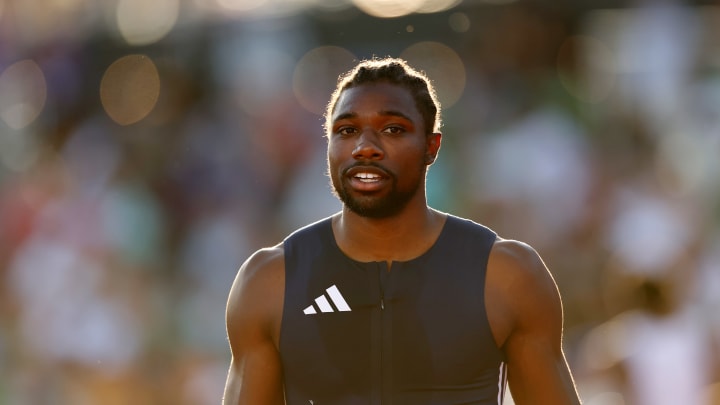Noah Lyles Chases Usain Bolt and the Sprint Double at the Paris Olympics

High among top improbable feats in track and field, up near the border of impossible, is a combination of gold medals many elite sprinters wouldn’t dare attempt. On the surface, it sounds simple. Win gold in the 100 meters. Then win gold in the 200 meters.
And yet, only nine men have completed The Double in the history of the Olympics. More than half won completed their double by 1936—and eight of nine did so before by the turn of this century. Usain Bolt doubled at Beijing 2008, London 2012 and Rio 2016. (On the women’s side, seven competitors in Olympic history have completed doubles. Only one female sprinter has doubled this century—Elaine Thompson-Herah, who did it twice in 2012 and ‘16.
As far as U.S. sprinters, the last man and woman to complete this particular double are both icons from the 1980s. Carl Lewis completed his double in 1984; Florence Griffith-Joyner, in ’88. All of which makes Noah Lyles’ upcoming schedule that much more intriguing. He won both events at the last world championships, although that’s not exactly an even comparison for what’s ahead.
To even attempt such insanity says something about Lyles, about the way he has always been, since birth. At first, he just ran. Then, he ran fast. Then, he began noticing Olympians—Jearl Miles, Joetta Clark, Hazel Clark—who were also family friends. He didn’t know it then, but his attempt at The Double had been set in motion.
He didn’t decide to make a literal sprint toward the Olympics until watching the opening ceremony in London in 2012—that altered how he viewed the Games and their significance. He decided to make the next U.S. national team, ahead of Rio, but fell short. He qualified for the Tokyo Games while dealing with depression and anxiety.
His coach, Lance Brauman, knew doubling was possible from the first time they met. Lyles already ranked among the strongest 200-meter runners in his age group, then in the world. But he had also won a world junior championship in the 100, which meant, in theory, he could do the same thing at higher levels, too. Brauman says Lyles needed to get stronger and more physical in order to handle the rounds required of any aspiring double-r.
They trained for that. At the world championships in 2022, Lyles clocked a 19.31-seconds 200-meter dash, only 0.12 off Bolt’s world mark. Right around then, his dream of doubling rounded into view. At the ’23 world championships, Netflix film crew in tow, he decided to attempt the double and see how it went. Pretty well, it turns out; he won both.
“That put him in a totally different conversation,” says Lyles’ mother, Keisha Bishop.
But the world championships don’t always include all of the best athletes. At the Olympics, the field features nearly every top competitor, at or near peak performance.
The double might appear simple: run fast at the shortest Olympic distance and win; double the length and win again. But there’s so many factors and variables beyond the surface glance. Lyles needed to maintain his strength to muscle through 100-meter finals. But adding too much muscle could slow him in both races. Lyles would need to be fast, but in different ways, which would require tweaks to his diet, workouts and rest schedule. He needed to prepare his body for six rounds in the 100 and the 200, plus any additional relays he might run.
“Most people have no idea what goes into it,” Brauman says.
As for specific adjustments to his regimen, Brauman politely declines to share any relevant details. But he does cite major gains in Lyles’ cerebral approach to sprinting. “He can make changes that some athletes aren’t able to [make],” Brauman says. “Just feeling different parts of his body and where they’re at in space at times, and being proprioceptively aware of how different segments of his body are moving, in order to fire patterns of muscles and everything else in that way.
“It’s a combination of everything. But that’s part of it. He’s a couple years older and has a better understanding of the sport and who he is.”
Four-time Olympic gold medalist Michael Johnson loves everything about Lyles. He says Lyles’ colorful personality reminds him of a former teammate, Maurice Greene.
“Noah, he can back it up,” Johnson says. “He’s literally unafraid to have the spotlight on him, but [he will] also go out there and perform.”
Lyles did just that in Eugene, Ore., at the U.S. Olympic trials. Now, he must do the same thing against the world’s best sprinters in Paris—on the double.
